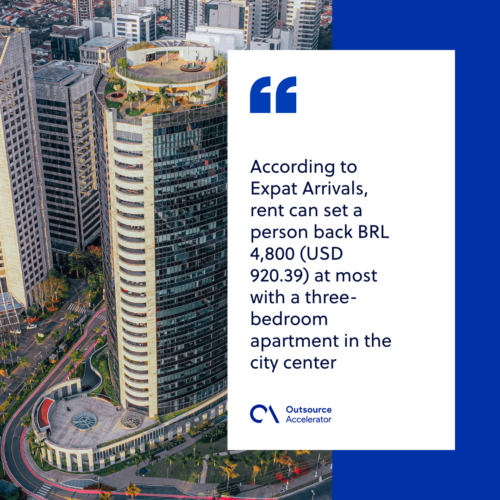What is the average salary in Brazil?

Whether you’re thinking about working in or outsourcing your activities to this South American country, you must be aware of the latest data on the average salary in Brazil.
That said, obtaining information about a country’s cost of living and employment trends is one of the most important parts of research. This is especially true when it comes to exploring employment and business opportunities.
The average salary in Brazil (2023)
According to Salary Explorer, the average salary in Brazil this year is 8,220 Brazilian Real (BRL). By law, the minimum wage is BRL 1,212. Meanwhile, the maximum wage is around BRL 38,200.
The figures in US dollars can range from USD 235.91 (lowest) to USD 7,326.71 (highest), depending on the current foreign exchange rate.
With these average wage figures, Brazilian locals, expatriates, and immigrants can live a comfortable life.

The cost of living in Brazil
When it comes to living in the country, there might be times when the median salary in Brazil may seem too little or too limiting.
This can be a point of concern for companies exploring the option of offshoring to Brazil. That’s because, in order to be competitive, they have to offer salaries higher than that of local companies.
Rent and accommodation
As expected, rent prices become steeper the nearer the property is to the city centers. Like in any other country, rent in central business districts is much more expensive than in rural areas.
According to Expat Arrivals, rent can set a person back BRL 4,800 (USD 920.39) at most with a three-bedroom apartment in the city center. However, cheaper accommodation options closer to minimum wage are available elsewhere.

Necessities and utilities
For a small household of fewer than three people with an average income, necessities such as groceries and basic utilities can run from BRL 380 to BRL 400 (USD 74 – USD 78) if we go with Expat Arrivals statistics.
Many people, including locals, find that some basic grocery items are cheaper in Brazil than elsewhere. Of course, it heavily depends on the location; for instance, items in Rio de Janeiro are a tad bit pricier than in other towns.
Transportation
In a recent Statista survey, 54% of people living in the country reported having their own mode of transportation. That being said, many public transport options are available in central business districts in the country.
In Rio de Janeiro, a monthly subway ticket costs around BRL 213.80, which is about USD 41.
The top-paid careers in Brazil.
In every sector, positions will always pay better than others, especially when compared side by side. The following careers land on the higher spectrum of the average salary in Brazil.
Healthcare and medical
Nurses, doctors, lab technicians, and other medical and healthcare practitioners earn an average of BRL 12,800 (USD 2,454.13). This figure includes all benefits that are expected from employers.
Keep in mind that salaries may have lapsed between medical and healthcare positions as the scope of their jobs is vastly different.

General business management
As expected, managerial positions often pay better than rank-and-file roles. The median salary for a manager is around BRL 13,000 (USD 2,492.47). Of course, working for a major multinational company can change this figure.
Figures from Glassdoor report that someone in a managerial position can earn up to BRL 20,000 a month.
Companies in these sectors often try to find ways to cut costs and expenses. Most outsource positions to business process outsourcing (BPO) companies and independent contractors.
Oftentimes, they also look for a location with a lower labor cost than their home country.
How companies benefit from outsourcing to Brazil
Companies like Aidey, Conduent, and Central 24 Horas are just some of the top BPO companies in Brazil. These service providers offer guided outsourcing services for their clients, along with guaranteed savings of up to 70%.
Increased profit margins
Outsourcing internal operations to Brazil can help businesses save time and money. Hiring and training an in-house team can be expensive and time-consuming, especially in countries with high labor and operating costs.
A growing population of college graduates
With fresh graduates and career shifters saturating the country’s talent pool, employers wouldn’t have a problem filling in positions with highly qualified individuals.
Lower cost of labor
On January 1, 2022, Brazil President Jair Bolsonaro raised Brazil’s minimum wage to BRL 1,212 (US$217.18) per month.
However, even with the minimum salary raised, Brazilian companies (and outsourcing firms) still operate at lower costs than US or EU-based organizations.
Strategic alliances and market entry
Brazil offers opportunities for strategic alliances or acquisition plays with local firms to facilitate market entry. Local firms with strong expertise in areas like SAP or Oracle can be viable options.
Proximity to the US and Canada
Brazil is a beautiful, growing country in close proximity to the mega countries, the US and Canada. With how close Brazil-based BPO companies are, organizations from North America have no problem with offshoring or outsourcing their business activities there.
In recent times, offshoring to neighboring countries has been called “nearshoring.” It’s the same thing as the practice it took after, but the main difference is geographical location. Nevertheless, the benefits of offshoring and outsourcing remain the same.
Nearshoring to Brazil
More and more service providers are offering their services to kickstart their clientele’s offshoring activities in Brazil. Companies in North America and Europe have been eyeing Brazil as their next offshoring destination due to its proximity.
Coupled with a low average salary — which implies low-cost labor — Brazil offers a lot of advantages to neighboring countries in terms of cost-effectiveness and diverse talent access.







 Independent
Independent




